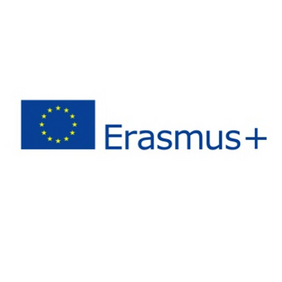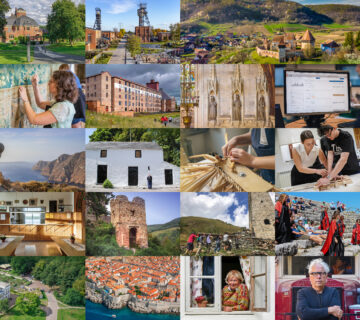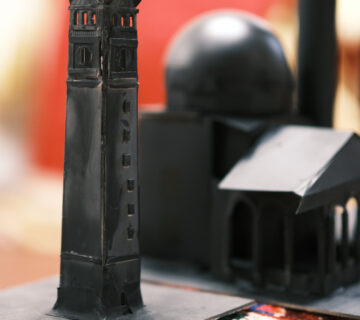In the shadow of the Brexit vote to leave the European Union, for me, the Interpret Europe conference in Mechelen shines out like a beacon.
As a British-European archaeologist and historian, it was a revelation to find myself amidst adults of all ages, from many countries, with varied professions, all interested in the remit of ‘interpretation’. I also discovered that I had been an ‘interpreter’ for most of my professional life, without realising it. I frequently use archaeology and history as a vehicle for exploring contemporary issues, and here I found many others doing the same.
Although I had not been to an IE event previously, and only knew by name a couple of the participants, I found myself welcomed to share ideas and experiences, and part of a wide ranging, questioning and responsive programme – imaginatively shaped by the IE committee and superbly organised by Herita, the Flanders Heritage Association.
Our schedule at the Lamot Conference and Heritage Centre (a successfully modernised and transformed former brewery) was full, with parallel sessions, presentations and workshops, discussions, lunches, fieldtrips, and dinners in fabulous heritage locations. One evening a memorable storyteller from Manchester, of Jamaican heritage, joined us at Alden Biesen Castle, the Grand Commandery of the Knights of the Teutonic Order (photo 2) -an intriguing and, hitherto, unlikely, coming together of very different cultural voices.
I took the opportunity to join the organised trips on either side of the conference: the World War 1 combat zone of Flanders Fields, including the cemetery at Tyne Cot (photo 3), the Passchendaele Memorial Museum and the controversial Menin Gate at Ypres, memorial to 90,000 British and Commonwealth soldiers with no known grave. Members of our group laid a poppy wreath, and the ‘Last Post’ was played, as happens every evening. On the last day we went to the small medieval trading city of Bruges, an important centre of the Northern European Renaissance and now full of tourists – some of us went on a cycle tour and I had my first virtual reality heritage experience, which I highly recommend!
Mechelen itself was an interesting place to explore, a small town on a busy waterway, once a leading city of the Burgundian Court (that was an historical challenge for some of us) with its own treasures of Flemish heritage, a lively central market, a beguinage (worth looking up if you don’t know what that is, as I didn’t), ‘flemish-bond’ brick buildings including a Renaissance palace where thinkers including Thomas More and Erasmus came to stay, a striking Rubens tryptich of the Miracle of the Fishes, and a modern brewery with delicious beers, heir to a medieval brewing tradition Run by women.
I also enjoyed an Afropean shop Run by a Nigerian woman selling very stylish, tailored clothes made by combining colourful West African printed cottons with more sombre European fabrics.
But definitely the most challenging heritage site in Mechelen is the Kazerne Dossin -the transportation hub from where thousands of Jewish people were sent to Auschwitz during World War 2, and now a memorial, museum and documentation centre.
And so what is this thing called ‘Interpretation’, and what were the questions which challenged us this year? Mindful of the hazards of the potential dominance of Eurocentric perspectives, I don’t think the conference fell into that trap, even though our theme was Interpretation for the Future of Europe, and our material was European. That is perhaps because the essence of Interpretation is about questioning and encouraging people to see and understand things with fresh eyes and new perspectives.
We considered the role of remembrance in the context of war and peace, of reflection on big issues including mass violence, the mass movement of people and refugees, conflicting religions, politics, states and nation states, and the value of heritage interpretation and making museums within these contexts. These are universal and present-day issues, and interpretation is relevant and important anywhere, in any time or place, revealing new narratives and voices to bring people together. The two caveats underpinning the Interpret Europe conference seemed to be that Interpretation must essentially be inclusive and founded on the bedrock of Human Rights.
Lucy Walker is a freelance archaeologist and historian, affiliated to the Pacitti Company Think Tank in Ipswich, and the McDonald Institute for Archaeological Research, Cambridge University. She is a trustee of the Museum of Cambridge and Chair of the Mill Road History Society (www.accessarchaeology.co.uk; lucywalker1@gmail.com).
To cite this article:
Walker, L. (2016) ‘IE Conference 2016: Ears hear and eyes see – what then does mind do’. In Interpret Europe Newsletter 2-2016, 3
Available online:
https://www.interpret-europe.net/fileadmin/Documents/publications/Newsletters/ie-newsletter_2016-2_summer.pdf




